Ethics Case Study Analysis: Snowden, Sterling, Software
VerifiedAdded on 2023/06/03
|7
|1650
|393
Case Study
AI Summary
This assignment presents a comprehensive analysis of three distinct case studies centered on ethical dilemmas. The first case examines the ethical implications of Edward Snowden's leak of classified information from the National Security Agency (NSA), exploring issues of data privacy, national security, and the application of deontological ethics. The second case study delves into the controversy surrounding Donald Sterling's racist remarks as the owner of the Los Angeles Clippers, focusing on issues of discrimination, privacy breaches, and the application of both deontological and virtue ethics. The final case study addresses a software licensing issue within a company, involving a conflict between following ethical guidelines and potential financial gains, further analyzing the application of deontological ethics and potential breaches. Each case study is thoroughly dissected by answering a series of questions designed to explore the facts, ethical issues, implications, and potential solutions, providing a framework for understanding and navigating complex ethical situations.
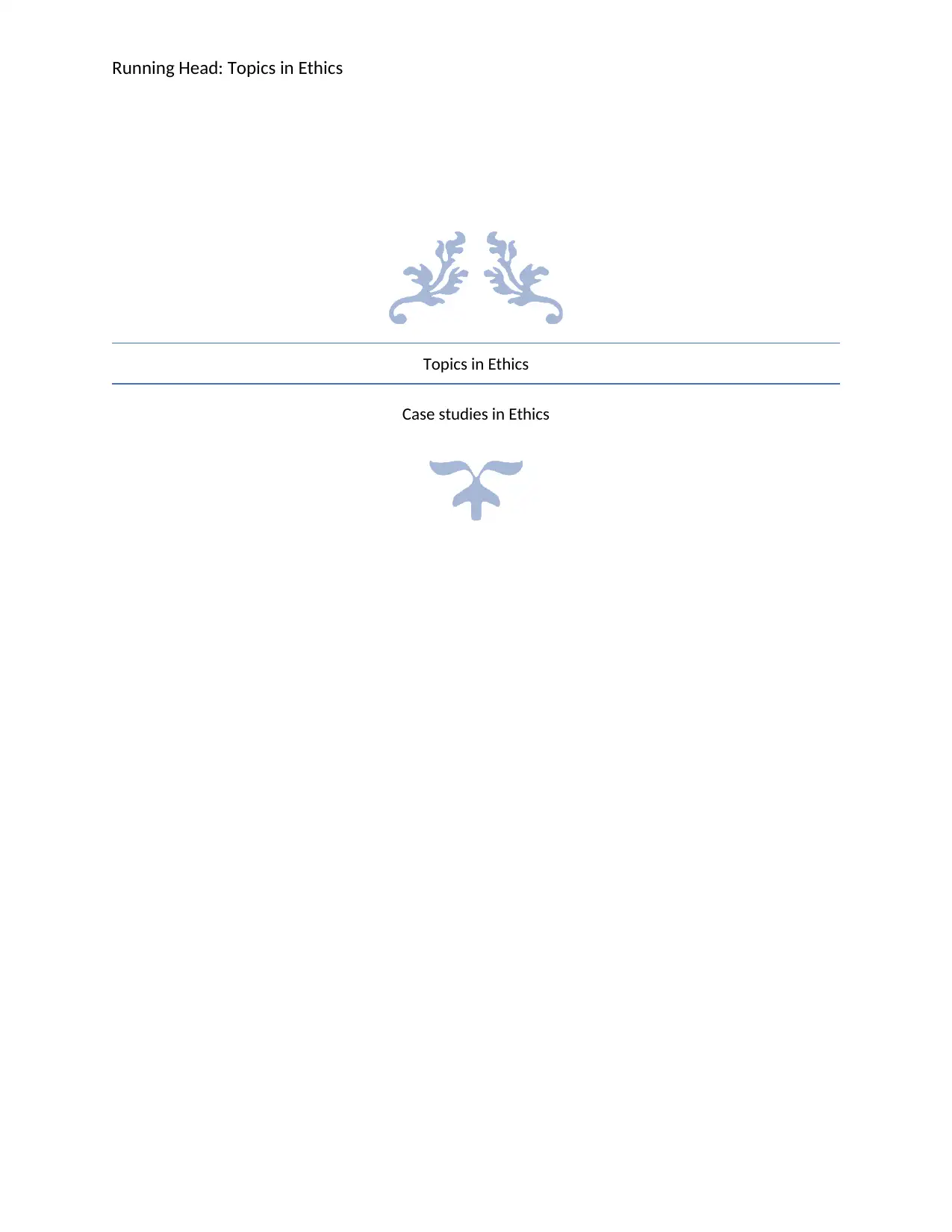
Running Head: Topics in Ethics
Topics in Ethics
Case studies in Ethics
Topics in Ethics
Case studies in Ethics
Paraphrase This Document
Need a fresh take? Get an instant paraphrase of this document with our AI Paraphraser
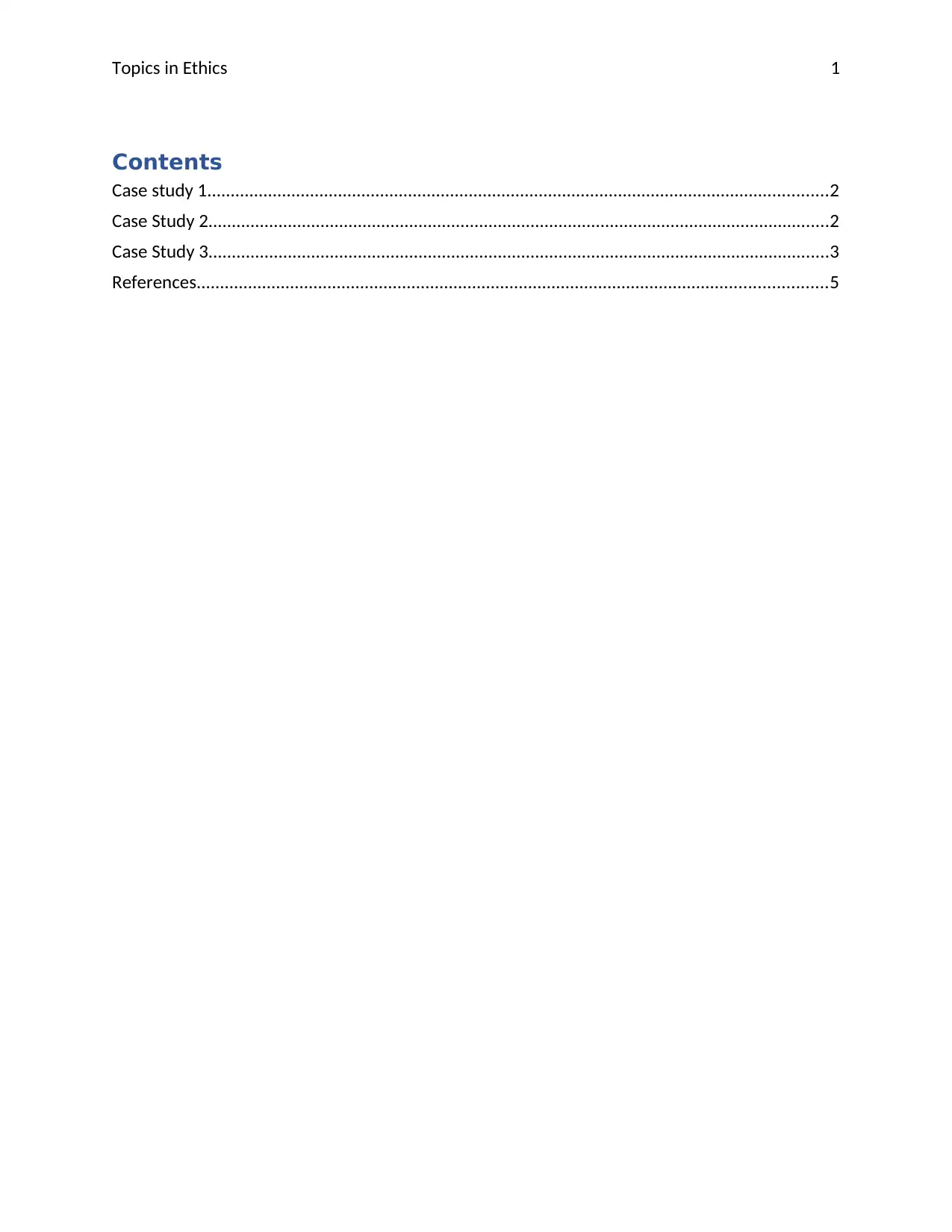
Topics in Ethics
Contents
Case study 1.....................................................................................................................................2
Case Study 2.....................................................................................................................................2
Case Study 3.....................................................................................................................................3
References.......................................................................................................................................5
1
Contents
Case study 1.....................................................................................................................................2
Case Study 2.....................................................................................................................................2
Case Study 3.....................................................................................................................................3
References.......................................................................................................................................5
1
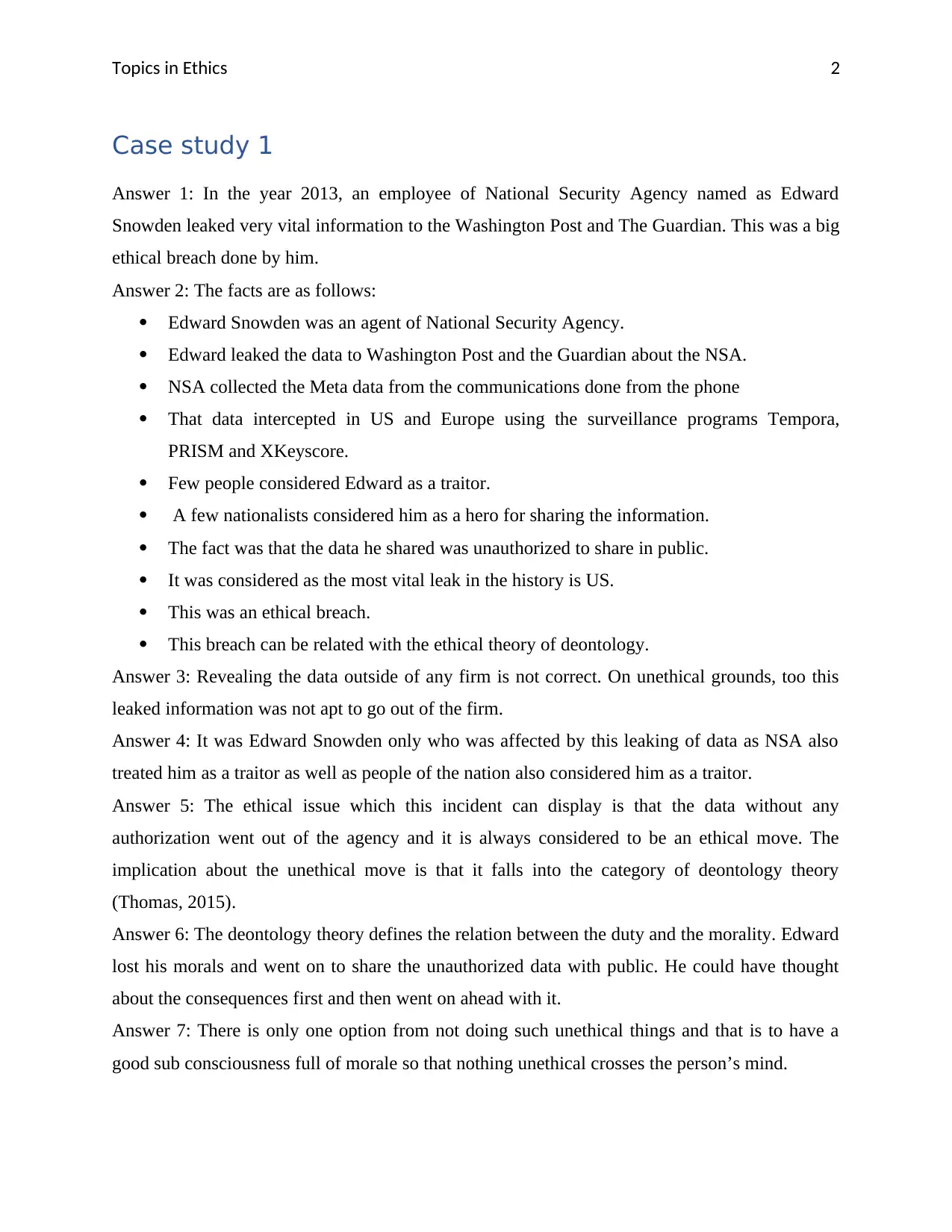
Topics in Ethics
Case study 1
Answer 1: In the year 2013, an employee of National Security Agency named as Edward
Snowden leaked very vital information to the Washington Post and The Guardian. This was a big
ethical breach done by him.
Answer 2: The facts are as follows:
Edward Snowden was an agent of National Security Agency.
Edward leaked the data to Washington Post and the Guardian about the NSA.
NSA collected the Meta data from the communications done from the phone
That data intercepted in US and Europe using the surveillance programs Tempora,
PRISM and XKeyscore.
Few people considered Edward as a traitor.
A few nationalists considered him as a hero for sharing the information.
The fact was that the data he shared was unauthorized to share in public.
It was considered as the most vital leak in the history is US.
This was an ethical breach.
This breach can be related with the ethical theory of deontology.
Answer 3: Revealing the data outside of any firm is not correct. On unethical grounds, too this
leaked information was not apt to go out of the firm.
Answer 4: It was Edward Snowden only who was affected by this leaking of data as NSA also
treated him as a traitor as well as people of the nation also considered him as a traitor.
Answer 5: The ethical issue which this incident can display is that the data without any
authorization went out of the agency and it is always considered to be an ethical move. The
implication about the unethical move is that it falls into the category of deontology theory
(Thomas, 2015).
Answer 6: The deontology theory defines the relation between the duty and the morality. Edward
lost his morals and went on to share the unauthorized data with public. He could have thought
about the consequences first and then went on ahead with it.
Answer 7: There is only one option from not doing such unethical things and that is to have a
good sub consciousness full of morale so that nothing unethical crosses the person’s mind.
2
Case study 1
Answer 1: In the year 2013, an employee of National Security Agency named as Edward
Snowden leaked very vital information to the Washington Post and The Guardian. This was a big
ethical breach done by him.
Answer 2: The facts are as follows:
Edward Snowden was an agent of National Security Agency.
Edward leaked the data to Washington Post and the Guardian about the NSA.
NSA collected the Meta data from the communications done from the phone
That data intercepted in US and Europe using the surveillance programs Tempora,
PRISM and XKeyscore.
Few people considered Edward as a traitor.
A few nationalists considered him as a hero for sharing the information.
The fact was that the data he shared was unauthorized to share in public.
It was considered as the most vital leak in the history is US.
This was an ethical breach.
This breach can be related with the ethical theory of deontology.
Answer 3: Revealing the data outside of any firm is not correct. On unethical grounds, too this
leaked information was not apt to go out of the firm.
Answer 4: It was Edward Snowden only who was affected by this leaking of data as NSA also
treated him as a traitor as well as people of the nation also considered him as a traitor.
Answer 5: The ethical issue which this incident can display is that the data without any
authorization went out of the agency and it is always considered to be an ethical move. The
implication about the unethical move is that it falls into the category of deontology theory
(Thomas, 2015).
Answer 6: The deontology theory defines the relation between the duty and the morality. Edward
lost his morals and went on to share the unauthorized data with public. He could have thought
about the consequences first and then went on ahead with it.
Answer 7: There is only one option from not doing such unethical things and that is to have a
good sub consciousness full of morale so that nothing unethical crosses the person’s mind.
2
⊘ This is a preview!⊘
Do you want full access?
Subscribe today to unlock all pages.

Trusted by 1+ million students worldwide
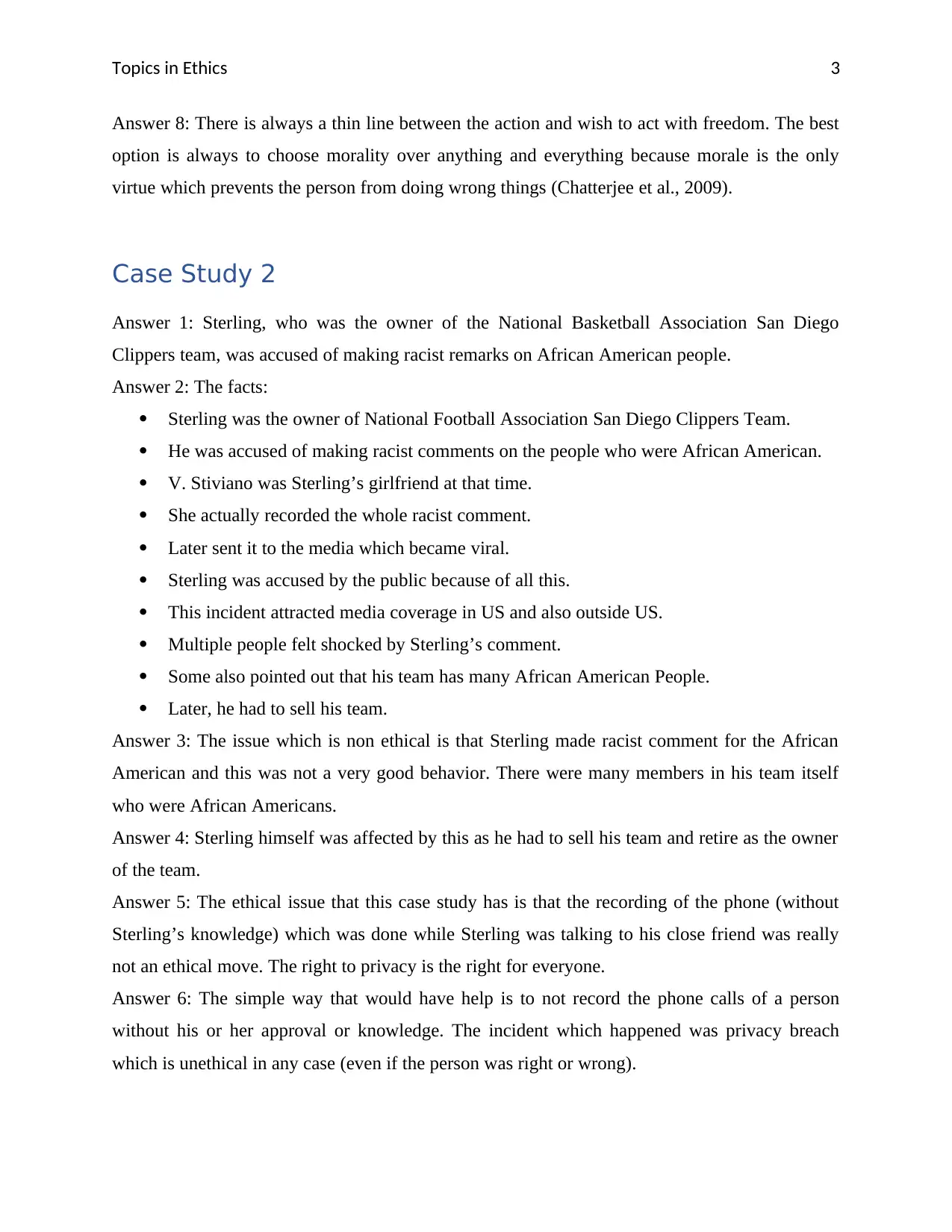
Topics in Ethics
Answer 8: There is always a thin line between the action and wish to act with freedom. The best
option is always to choose morality over anything and everything because morale is the only
virtue which prevents the person from doing wrong things (Chatterjee et al., 2009).
Case Study 2
Answer 1: Sterling, who was the owner of the National Basketball Association San Diego
Clippers team, was accused of making racist remarks on African American people.
Answer 2: The facts:
Sterling was the owner of National Football Association San Diego Clippers Team.
He was accused of making racist comments on the people who were African American.
V. Stiviano was Sterling’s girlfriend at that time.
She actually recorded the whole racist comment.
Later sent it to the media which became viral.
Sterling was accused by the public because of all this.
This incident attracted media coverage in US and also outside US.
Multiple people felt shocked by Sterling’s comment.
Some also pointed out that his team has many African American People.
Later, he had to sell his team.
Answer 3: The issue which is non ethical is that Sterling made racist comment for the African
American and this was not a very good behavior. There were many members in his team itself
who were African Americans.
Answer 4: Sterling himself was affected by this as he had to sell his team and retire as the owner
of the team.
Answer 5: The ethical issue that this case study has is that the recording of the phone (without
Sterling’s knowledge) which was done while Sterling was talking to his close friend was really
not an ethical move. The right to privacy is the right for everyone.
Answer 6: The simple way that would have help is to not record the phone calls of a person
without his or her approval or knowledge. The incident which happened was privacy breach
which is unethical in any case (even if the person was right or wrong).
3
Answer 8: There is always a thin line between the action and wish to act with freedom. The best
option is always to choose morality over anything and everything because morale is the only
virtue which prevents the person from doing wrong things (Chatterjee et al., 2009).
Case Study 2
Answer 1: Sterling, who was the owner of the National Basketball Association San Diego
Clippers team, was accused of making racist remarks on African American people.
Answer 2: The facts:
Sterling was the owner of National Football Association San Diego Clippers Team.
He was accused of making racist comments on the people who were African American.
V. Stiviano was Sterling’s girlfriend at that time.
She actually recorded the whole racist comment.
Later sent it to the media which became viral.
Sterling was accused by the public because of all this.
This incident attracted media coverage in US and also outside US.
Multiple people felt shocked by Sterling’s comment.
Some also pointed out that his team has many African American People.
Later, he had to sell his team.
Answer 3: The issue which is non ethical is that Sterling made racist comment for the African
American and this was not a very good behavior. There were many members in his team itself
who were African Americans.
Answer 4: Sterling himself was affected by this as he had to sell his team and retire as the owner
of the team.
Answer 5: The ethical issue that this case study has is that the recording of the phone (without
Sterling’s knowledge) which was done while Sterling was talking to his close friend was really
not an ethical move. The right to privacy is the right for everyone.
Answer 6: The simple way that would have help is to not record the phone calls of a person
without his or her approval or knowledge. The incident which happened was privacy breach
which is unethical in any case (even if the person was right or wrong).
3
Paraphrase This Document
Need a fresh take? Get an instant paraphrase of this document with our AI Paraphraser
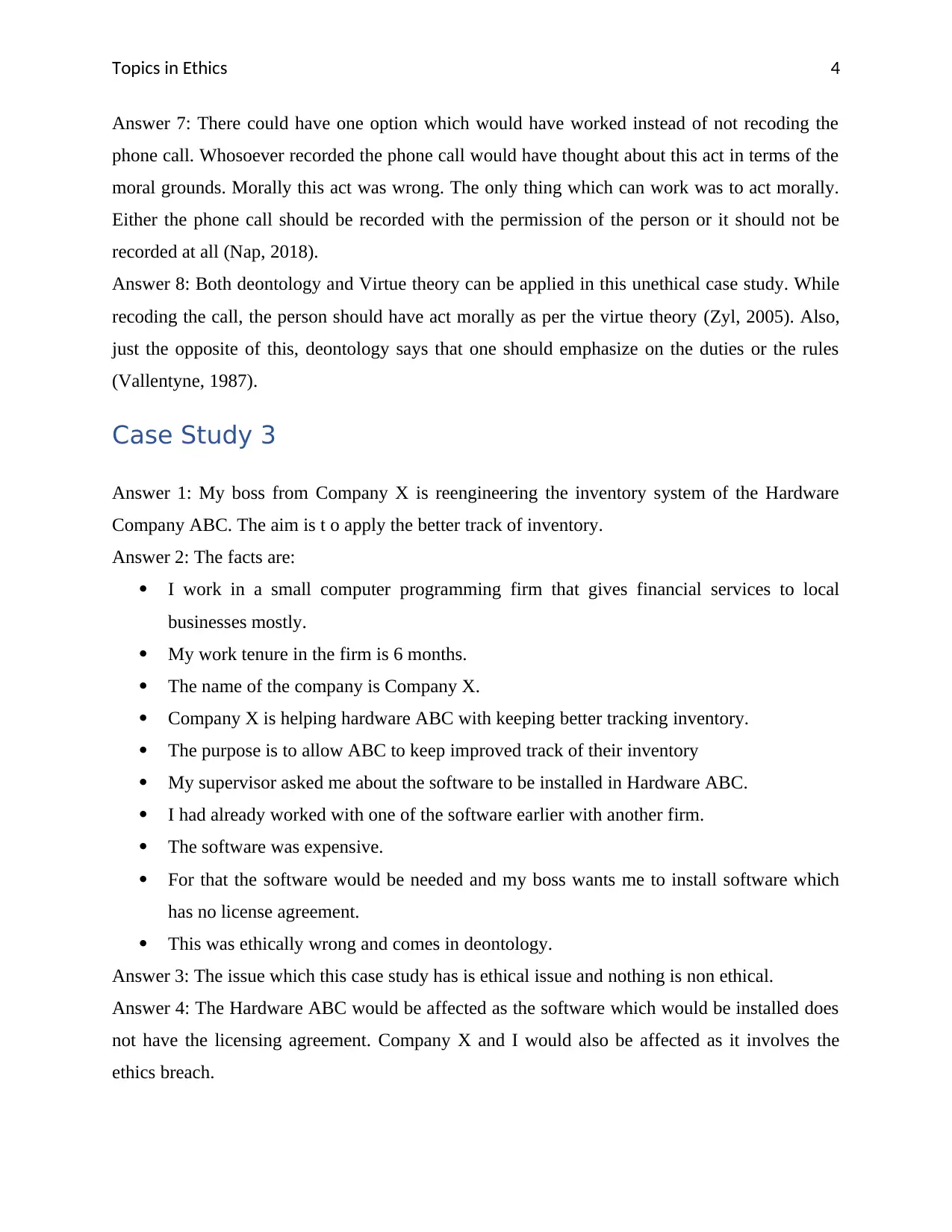
Topics in Ethics
Answer 7: There could have one option which would have worked instead of not recoding the
phone call. Whosoever recorded the phone call would have thought about this act in terms of the
moral grounds. Morally this act was wrong. The only thing which can work was to act morally.
Either the phone call should be recorded with the permission of the person or it should not be
recorded at all (Nap, 2018).
Answer 8: Both deontology and Virtue theory can be applied in this unethical case study. While
recoding the call, the person should have act morally as per the virtue theory (Zyl, 2005). Also,
just the opposite of this, deontology says that one should emphasize on the duties or the rules
(Vallentyne, 1987).
Case Study 3
Answer 1: My boss from Company X is reengineering the inventory system of the Hardware
Company ABC. The aim is t o apply the better track of inventory.
Answer 2: The facts are:
I work in a small computer programming firm that gives financial services to local
businesses mostly.
My work tenure in the firm is 6 months.
The name of the company is Company X.
Company X is helping hardware ABC with keeping better tracking inventory.
The purpose is to allow ABC to keep improved track of their inventory
My supervisor asked me about the software to be installed in Hardware ABC.
I had already worked with one of the software earlier with another firm.
The software was expensive.
For that the software would be needed and my boss wants me to install software which
has no license agreement.
This was ethically wrong and comes in deontology.
Answer 3: The issue which this case study has is ethical issue and nothing is non ethical.
Answer 4: The Hardware ABC would be affected as the software which would be installed does
not have the licensing agreement. Company X and I would also be affected as it involves the
ethics breach.
4
Answer 7: There could have one option which would have worked instead of not recoding the
phone call. Whosoever recorded the phone call would have thought about this act in terms of the
moral grounds. Morally this act was wrong. The only thing which can work was to act morally.
Either the phone call should be recorded with the permission of the person or it should not be
recorded at all (Nap, 2018).
Answer 8: Both deontology and Virtue theory can be applied in this unethical case study. While
recoding the call, the person should have act morally as per the virtue theory (Zyl, 2005). Also,
just the opposite of this, deontology says that one should emphasize on the duties or the rules
(Vallentyne, 1987).
Case Study 3
Answer 1: My boss from Company X is reengineering the inventory system of the Hardware
Company ABC. The aim is t o apply the better track of inventory.
Answer 2: The facts are:
I work in a small computer programming firm that gives financial services to local
businesses mostly.
My work tenure in the firm is 6 months.
The name of the company is Company X.
Company X is helping hardware ABC with keeping better tracking inventory.
The purpose is to allow ABC to keep improved track of their inventory
My supervisor asked me about the software to be installed in Hardware ABC.
I had already worked with one of the software earlier with another firm.
The software was expensive.
For that the software would be needed and my boss wants me to install software which
has no license agreement.
This was ethically wrong and comes in deontology.
Answer 3: The issue which this case study has is ethical issue and nothing is non ethical.
Answer 4: The Hardware ABC would be affected as the software which would be installed does
not have the licensing agreement. Company X and I would also be affected as it involves the
ethics breach.
4
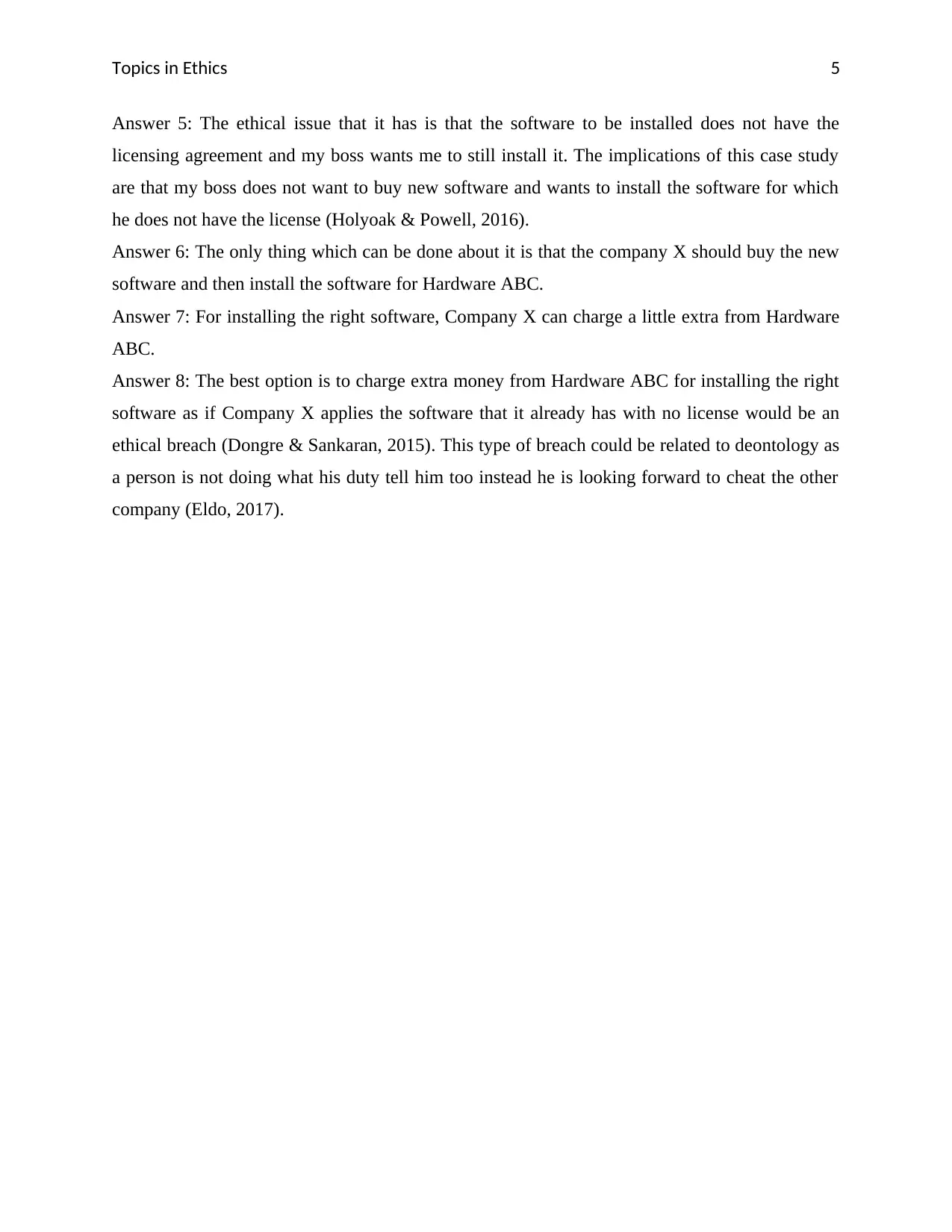
Topics in Ethics
Answer 5: The ethical issue that it has is that the software to be installed does not have the
licensing agreement and my boss wants me to still install it. The implications of this case study
are that my boss does not want to buy new software and wants to install the software for which
he does not have the license (Holyoak & Powell, 2016).
Answer 6: The only thing which can be done about it is that the company X should buy the new
software and then install the software for Hardware ABC.
Answer 7: For installing the right software, Company X can charge a little extra from Hardware
ABC.
Answer 8: The best option is to charge extra money from Hardware ABC for installing the right
software as if Company X applies the software that it already has with no license would be an
ethical breach (Dongre & Sankaran, 2015). This type of breach could be related to deontology as
a person is not doing what his duty tell him too instead he is looking forward to cheat the other
company (Eldo, 2017).
5
Answer 5: The ethical issue that it has is that the software to be installed does not have the
licensing agreement and my boss wants me to still install it. The implications of this case study
are that my boss does not want to buy new software and wants to install the software for which
he does not have the license (Holyoak & Powell, 2016).
Answer 6: The only thing which can be done about it is that the company X should buy the new
software and then install the software for Hardware ABC.
Answer 7: For installing the right software, Company X can charge a little extra from Hardware
ABC.
Answer 8: The best option is to charge extra money from Hardware ABC for installing the right
software as if Company X applies the software that it already has with no license would be an
ethical breach (Dongre & Sankaran, 2015). This type of breach could be related to deontology as
a person is not doing what his duty tell him too instead he is looking forward to cheat the other
company (Eldo, 2017).
5
⊘ This is a preview!⊘
Do you want full access?
Subscribe today to unlock all pages.

Trusted by 1+ million students worldwide
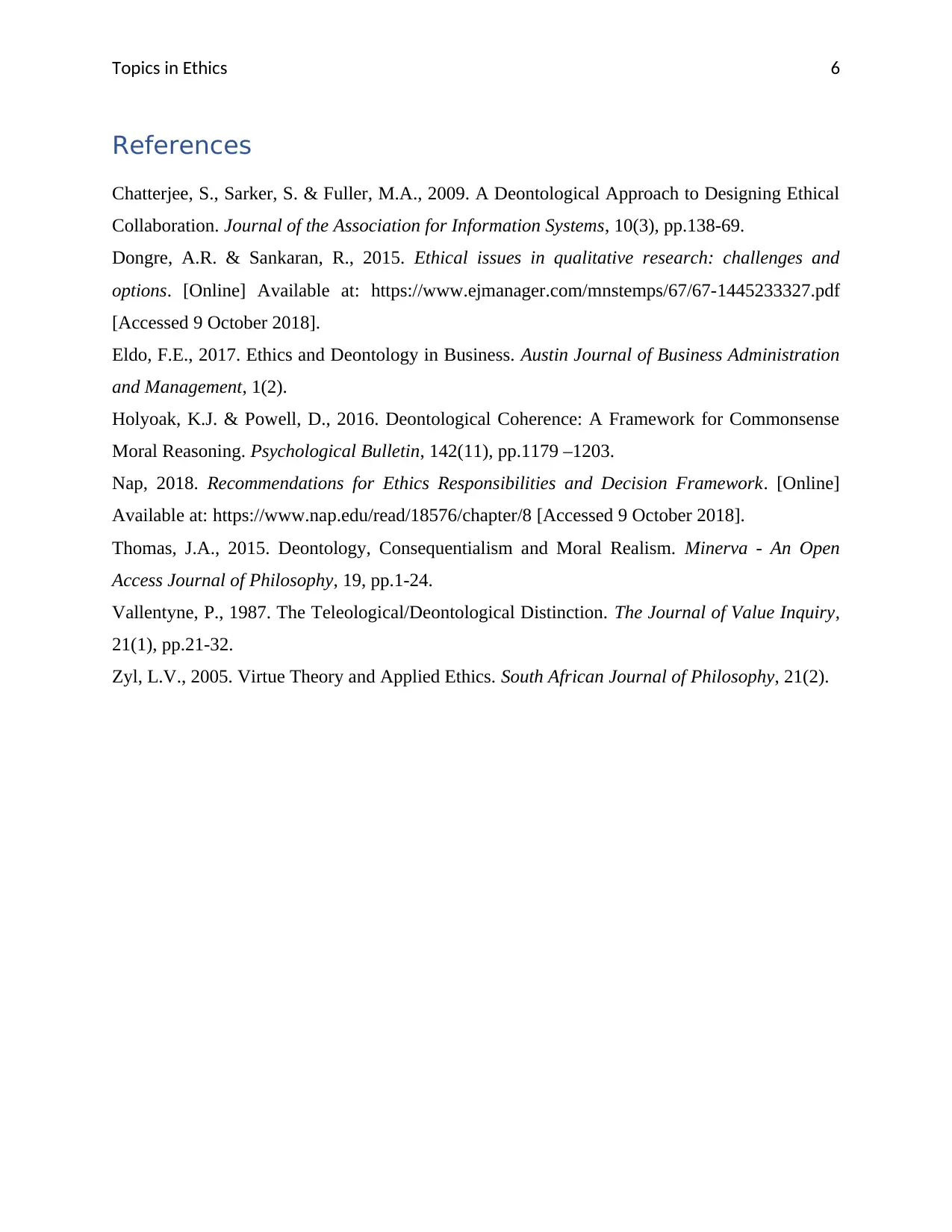
Topics in Ethics
References
Chatterjee, S., Sarker, S. & Fuller, M.A., 2009. A Deontological Approach to Designing Ethical
Collaboration. Journal of the Association for Information Systems, 10(3), pp.138-69.
Dongre, A.R. & Sankaran, R., 2015. Ethical issues in qualitative research: challenges and
options. [Online] Available at: https://www.ejmanager.com/mnstemps/67/67-1445233327.pdf
[Accessed 9 October 2018].
Eldo, F.E., 2017. Ethics and Deontology in Business. Austin Journal of Business Administration
and Management, 1(2).
Holyoak, K.J. & Powell, D., 2016. Deontological Coherence: A Framework for Commonsense
Moral Reasoning. Psychological Bulletin, 142(11), pp.1179 –1203.
Nap, 2018. Recommendations for Ethics Responsibilities and Decision Framework. [Online]
Available at: https://www.nap.edu/read/18576/chapter/8 [Accessed 9 October 2018].
Thomas, J.A., 2015. Deontology, Consequentialism and Moral Realism. Minerva - An Open
Access Journal of Philosophy, 19, pp.1-24.
Vallentyne, P., 1987. The Teleological/Deontological Distinction. The Journal of Value Inquiry,
21(1), pp.21-32.
Zyl, L.V., 2005. Virtue Theory and Applied Ethics. South African Journal of Philosophy, 21(2).
6
References
Chatterjee, S., Sarker, S. & Fuller, M.A., 2009. A Deontological Approach to Designing Ethical
Collaboration. Journal of the Association for Information Systems, 10(3), pp.138-69.
Dongre, A.R. & Sankaran, R., 2015. Ethical issues in qualitative research: challenges and
options. [Online] Available at: https://www.ejmanager.com/mnstemps/67/67-1445233327.pdf
[Accessed 9 October 2018].
Eldo, F.E., 2017. Ethics and Deontology in Business. Austin Journal of Business Administration
and Management, 1(2).
Holyoak, K.J. & Powell, D., 2016. Deontological Coherence: A Framework for Commonsense
Moral Reasoning. Psychological Bulletin, 142(11), pp.1179 –1203.
Nap, 2018. Recommendations for Ethics Responsibilities and Decision Framework. [Online]
Available at: https://www.nap.edu/read/18576/chapter/8 [Accessed 9 October 2018].
Thomas, J.A., 2015. Deontology, Consequentialism and Moral Realism. Minerva - An Open
Access Journal of Philosophy, 19, pp.1-24.
Vallentyne, P., 1987. The Teleological/Deontological Distinction. The Journal of Value Inquiry,
21(1), pp.21-32.
Zyl, L.V., 2005. Virtue Theory and Applied Ethics. South African Journal of Philosophy, 21(2).
6
1 out of 7
Your All-in-One AI-Powered Toolkit for Academic Success.
+13062052269
info@desklib.com
Available 24*7 on WhatsApp / Email
![[object Object]](/_next/static/media/star-bottom.7253800d.svg)
Unlock your academic potential
Copyright © 2020–2026 A2Z Services. All Rights Reserved. Developed and managed by ZUCOL.


